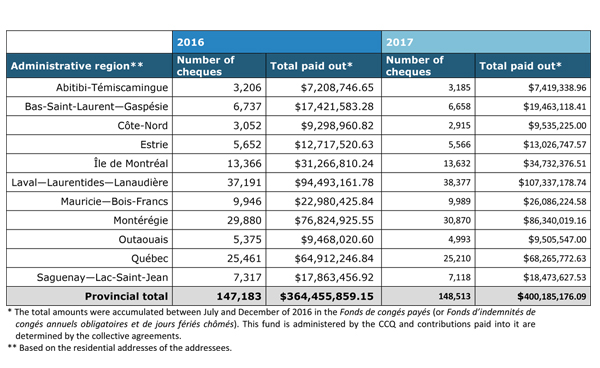Over the past few weeks, the Commission de la construction du Québec (CCQ) sent out more than 148,500 vacation cheques to Quebec construction workers. A total of $400M was distributed.

This represents an increase of approximately 10% in the total value of payments compared to the total amount paid out for the summer of 2016 ($364M). This difference is mainly due to increased construction activity during the last six months of 2016.
Construction holidays
This year, the two weeks of vacation for construction workers start officially on Sunday, July 23rd and end at midnight on Saturday, August 5th.
This vacation period is obligatory for the entire construction industry, all sectors included.
However, some work is excluded from this summer vacation period, including a large share of civil engineering and roadwork projects. In addition, emergency, repair, maintenance, renovation and modification work can continue. This is the case for certain school construction sites, for example.
A total of approximately 80% of the labour force, both employees and employers, will be on vacation during these two weeks. For your information, in 2016, the construction industry consisted of 153,700 employees and 25,736 employers.
Drive carefully
Once again this year, the CCQ has teamed up with the Sûreté du Québec to encourage those on vacation to drive carefully, as many families will be travelling. The CCQ invites the entire industry to exercise the greatest care and vigilance so that everyone returns to work safe and sound on August 7th.
Construction activity on the rise
2016 saw a 3.3% increase in the number of hours worked in the construction industry, reaching a total of 145 million hours. In fact, for construction activities subject to the Act Respecting Labour Relations, Vocational Training, and Workforce Management in the Construction Industry (Act R-20), last year represented a break in the downturn that had held sway since the peak reached in 2012.
For the first trimester of 2017, construction activity continued its end-of-year momentum, helped by a relatively mild winter, positive economic conditions and major construction projects, particularly in the Greater Montreal region. This resulted in 25.9 million hours worked, 9% more than for the same period in 2016.
